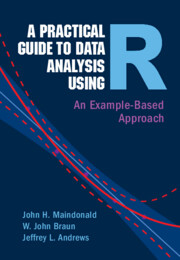Book contents
- Frontmatter
- Dedication
- Contents
- Figures
- Preface
- 1 Learning from Data, and Tools for the Task
- 2 Generalizing from Models
- 3 Multiple Linear Regression
- 4 Exploiting the Linear Model Framework
- 5 Generalized Linear Models, and Survival Analysis
- 6 Time Series Models
- 7 Multilevel Models, and Repeated Measures
- 8 Tree-Based Classification and Regression
- 9 Multivariate Data Exploration and Discrimination
- Appendix A The R System: a Brief Overview
- References
- References to R Packages
- Index of R Functions
- Index of Terms
2 - Generalizing from Models
Published online by Cambridge University Press: 11 May 2024
- Frontmatter
- Dedication
- Contents
- Figures
- Preface
- 1 Learning from Data, and Tools for the Task
- 2 Generalizing from Models
- 3 Multiple Linear Regression
- 4 Exploiting the Linear Model Framework
- 5 Generalized Linear Models, and Survival Analysis
- 6 Time Series Models
- 7 Multilevel Models, and Repeated Measures
- 8 Tree-Based Classification and Regression
- 9 Multivariate Data Exploration and Discrimination
- Appendix A The R System: a Brief Overview
- References
- References to R Packages
- Index of R Functions
- Index of Terms
Summary
Inferences are never assumption free. Data summaries that do not account for all relevant effects readily mislead. Distributions for the Pearson correlation and for counts, and extensions accounting for handling extra-binomial and extra-Poisson variation are noted. Notions of statistical power are introduced. Resampling methods, the bootstrap, and permutation tests, extend available inferential approaches. Regression with a single explanatory variable is used as a context in which to introduce residual plots, outliers, influence, robust regression, and standard errors of predicted values. There are two regression lines – that of y on x and that of x on y. Power transformations, with the logarithmic transformation as a special case, are often effective in giving a linear relationship. The training/test approach, and the closely allied of cross-validation approach, can be important for avoiding over-fitting. Other topics include one- and two-way comparisons, adjustments when there are multiple comparisons, and the estimation of false discovery rates when there is severe multiplicity. Discussions of theories of inference, including likelihood, and Bayes Factor and other Bayesian perspectives, ends the chapter.
Keywords
- Type
- Chapter
- Information
- A Practical Guide to Data Analysis Using RAn Example-Based Approach, pp. 88 - 143Publisher: Cambridge University PressPrint publication year: 2024



